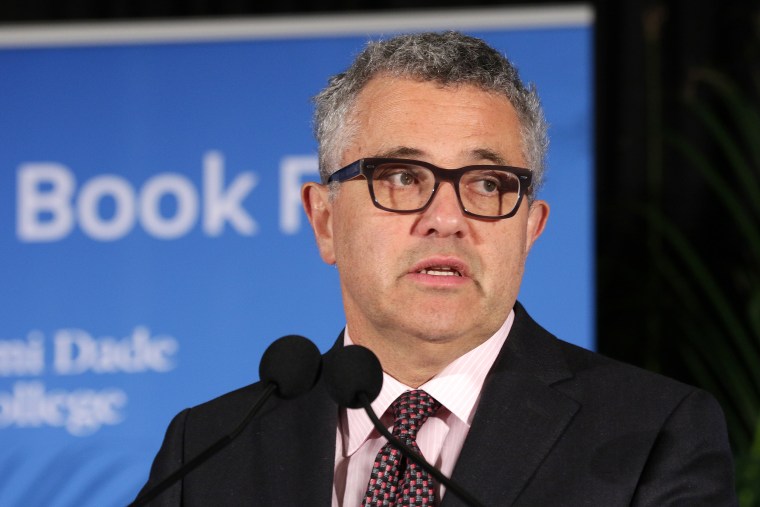Jeffrey Toobin’s return to CNN as a legal analyst on Thursday was a master class in how to evade accountability.
The subsequent outrage — pointing out the gendered double standards at play and the hypocrisy of “cancel culture” — underscores larger societal problems. Toobin got eight whole minutes of airtime to reframe and retell his now-infamous story. In doing so, Toobin demonstrated how culture can work in the service of men but also how it lacks the institutional apparatuses necessary for effective accountability generally.
CNN set the stage by choosing a white woman — the appropriate blend of mainstream feminism for viewers comprised of complicity and appeal — to direct Toobin’s performance. Anchor Alisyn Camerota’s sequence of questions allowed Toobin to cast himself, in his own words, as a relatable, "flawed human being who makes mistakes."
The logic Toobin employed in this exchange relied on keywords intended to evoke viewer sympathy. And the storyline is full of pathos.
First came the acknowledgement of the transgression carefully framed by self-deprecating language: It was a “stupid mistake” that was “moronic” and “indefensible.”
Toobin described the sequence of deliberate choices that led to a masturbatory act on a work call as a “mistake,” as if it were a random error. Never once did Toobin say these acts were choices, because to do so would be an acknowledgment of deliberate intent over a period of time. He reinforced this language of the “mistake” by saying he “wasn’t thinking very well or very much.” He is able to say it is “indefensible” without a hint of hypocrisy because “mistakes” don’t need to be defended.
Framed as a “mistake,” Toobin is able to avoid having to justify his deliberate choices that were calculated on the permissibility and success of risk.
Real accountability, in this moment, would not only be Toobin using the language of choice but acknowledging that his deliberate choice to masturbate during a work call was predicated on the assumption that he could take the risk and not face consequences.
Yet, framed as a “mistake,” Toobin is able to avoid having to justify his deliberate choices that were calculated on the permissibility and success of risk. Time and again, what is apparent is that people who look like Toobin — white and male and heterosexual and cisgender — are more able to take risks not afforded to others. The presumption that accountability doesn’t apply reinforces this cycle of power.
And cries of “cancel culture” as a pre-emptive rhetorical tactic only make accountability more difficult. The irony here is that the people who are, in fact, “canceled” rarely seem to be the ones endlessly bleating on about it on various media platforms (as Lisa Kudrow so brilliantly parodied in the “conservative voices are being silenced” scene from the mockumentary “Death to 2020”).
On Twitter, people were quick to contrast Toobin’s return with the fate of Associated Press news associate Emily Wilder, who was fired in large part for tweeting her support of Palestinians. And, of course, perhaps the most egregious example this century is that of Janet Jackson: Not only was she blacklisted after the 2004 Super Bowl halftime show “wardrobe malfunction,” but the man who actually did the deed, Justin Timberlake, faced no consequences at all.
The next step in Toobin’s master class was to validate the rarity of his “stupid mistake” with supporting evidence. He explained that he’s spoken to several of his former colleagues and that they “realized that this was not intended for them. I think they realized this was something I would immediately regret.”
Toobin claimed he’s offering no superficial "politician apology, which is 'I’m sorry if you were offended,'" but rather a sincere one. In this performative accountability, he knows an apology is simply the first step in the process. He looked directly at the camera — as if he were looking into our eyes — and explained why his apology is real, as evidenced by “therapy, trying to do some public service, working in a food bank ... working on a new book about the Oklahoma City bombing.”
In no way are volunteering at a food bank and writing a book practices of accountability that repair the harm he has caused or rebuild the trust he has forfeited. Yet, Toobin used them to wield the language of “crime and punishment” and “consequences” to show he has been held accountable — not just by comedians and defamed celebrities like O.J. Simpson, but by The New Yorker, which fired Toobin after an internal investigation.
In response to Camerota’s lob of a question, Toobin was quick to note that Condé Nast found no other transgression in his 27 years at the company. Then they continued:
"Do you think ... that the punishment fits the crime?" Camerota asked.
"No," Toobin said enthusiastically. "I love The New Yorker ... and I thought this punishment was excessive."
Toobin claimed he is “trying to become the kind of person that people can trust again,” but his performance on cable TV indicated he has yet to achieve this beyond skillful rhetoric. A culture of accountability, however, is not the exclusive work of the individual but of communities, and, particularly in this case, the institution of CNN. The network has yet to demonstrate how it has changed its policies or implemented a culture of accountability since Toobin's chosen eight-month leave of absence. The network’s own langue echoes Toobin’s “mistake” rhetoric as a way to excuse the need to make systemwide changes.
Clearly, our culture has failed to instantiate knowable practices of accountability. Instead, we are served vague and insulting gestures. There is no culture of accountability when offensive and harmful actions are repeatedly written off as “stupid mistakes.”


